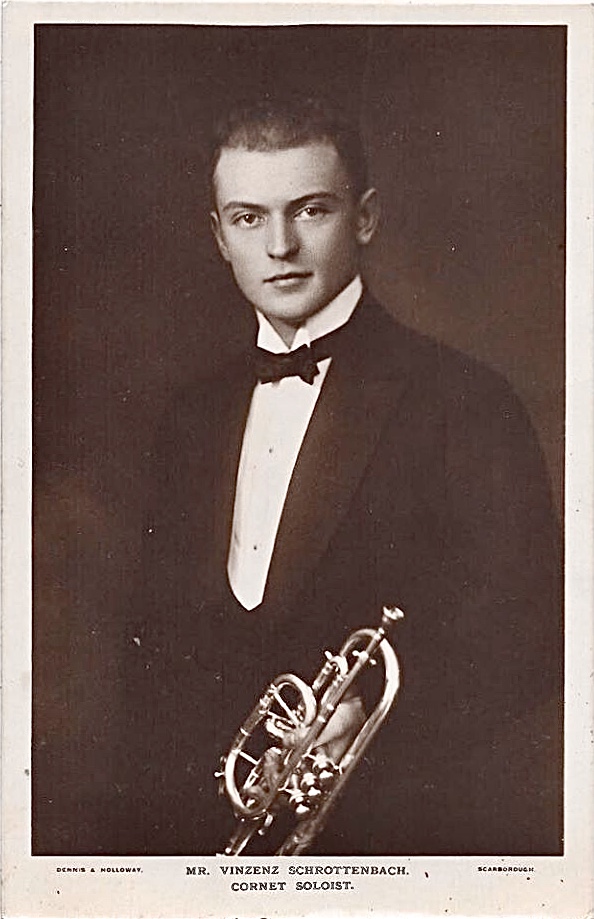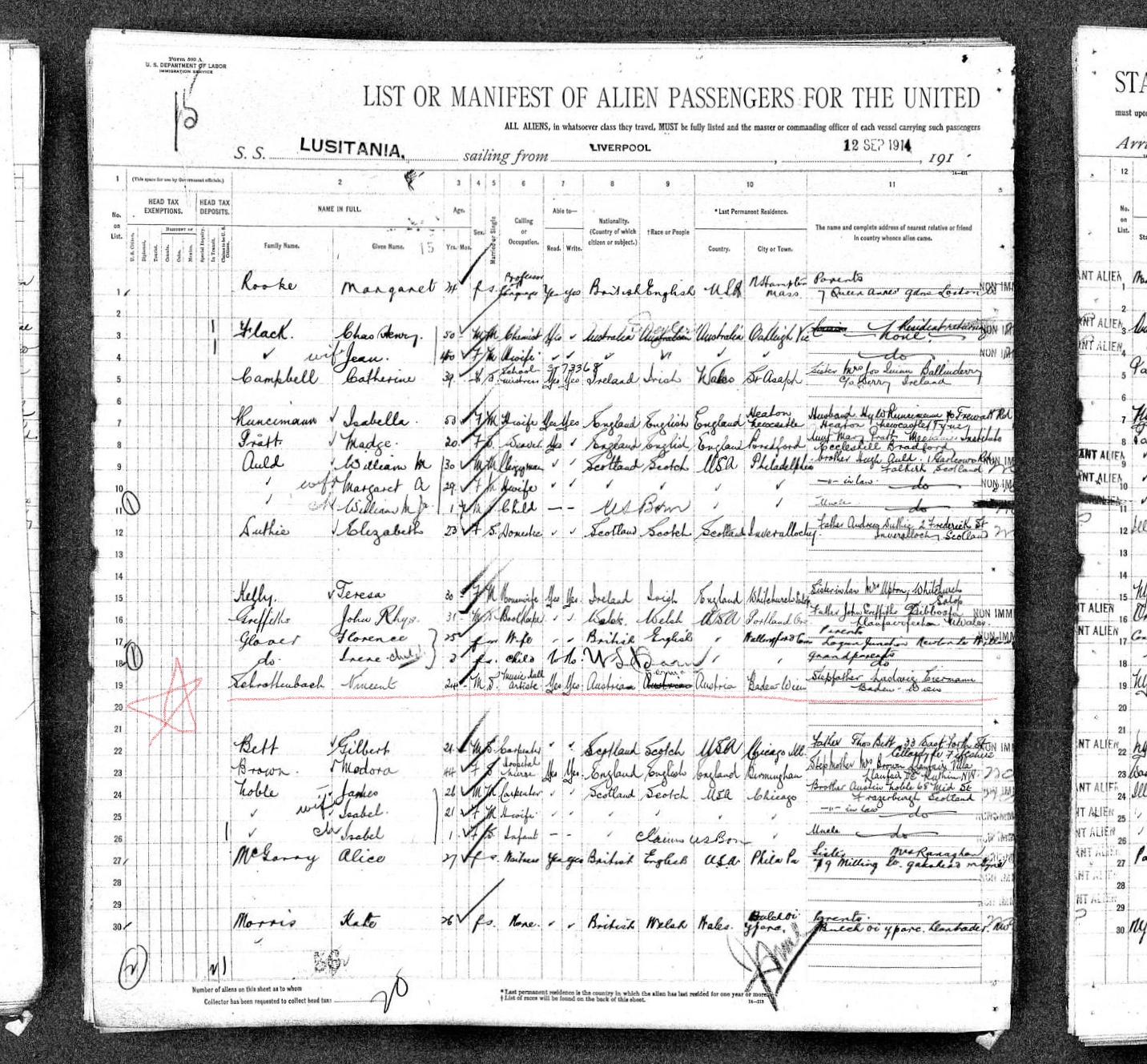Vinzenz Schrottenbach
-
Old photo of Vinzenz Schrottenbach, aka Vincent Bach.

-
His Rookie Card?
-
No. That was an unsigned autograph card for an already established soloist.
-
Wow, what a moment in history.
That shows Bach on tour in England in 1914 holding the Besson cornet he arrived in the US with (and which subsequently disappeared from the Bach plant after being acquired and handed over to the company). This is moments before the onset of WWI would force Bach to choose between being arrested as an enemy combatant (he was an Austrian Navy reservist), or fleeing to the US on the Lusitania a couple years before its sinking would bring the US into that war and draft Bach into an Army in combat with the military in which he had, and technically should have been, serving. He won the assistant principal trumpet slot in Boston auditioning on that horn in his hands - says a lot about his skills.
-
@OldSchoolEuph
Actually, he sailed to the U.S. on the Lusitania in September 1914, and the ship was sunk by a German U-boat 8 months later in May 1915. Here’s a copy of the passenger manifest.
-
@Dale-Proctor Yes, but the US entry into the war, generally thought to have been heavily influenced by a political marketing campaign highlighting the Lusitania, was not until April 1917. The ship was struck near shore by a single torpedo intended to cripple it. The massive loss of life was a result of loose coal dust not being properly cleaned-up in the bunkers which after being thrown into the air by the shock wave, detonated. This was used by American hawks to cast the German/Austrian side in a very negative light - quite effectively as we see by the actions of 1917.
-
@OldSchoolEuph
Well, when you knowingly torpedo a civilian passenger ship, you probably need to be seen in a negative light... -
Civilian ship, yes; but apart from passengers - many of whom were American volunteers for the British forces - she was carrying a freight of explosives and was in waters declared a war zone by both the British and the Germans.
As to Vinzenz Schrottenbach, he was not just an Austrian Navy reservist, he was a specialized engineer officer after first going through Cadet School and then taking up a Navy career. -
@OldSchoolEuph said in Vinzenz Schrottenbach:
@Dale-Proctor Yes, but the US entry into the war, generally thought to have been heavily influenced by a political marketing campaign highlighting the Lusitania, was not until April 1917. The ship was struck near shore by a single torpedo intended to cripple it. The massive loss of life was a result of loose coal dust not being properly cleaned-up in the bunkers which after being thrown into the air by the shock wave, detonated. This was used by American hawks to cast the German/Austrian side in a very negative light - quite effectively as we see by the actions of 1917.
[TANGENT]
The Germans had declared unrestricted submarine warfare against the USA at that point in time. The modern narrative is to frame the nation's entry into the war as a political move, something with which I have come to disagree. There are lots of fantastic lectures about the subject available on YouTube. -
It was the Zimmerman telegram that finally convinced the USA into enter WWI. The USA had gone to great lengths to avoid war up until that point.
-
@Newell-Post said in Vinzenz Schrottenbach:
It was the Zimmerman telegram that finally convinced the USA into enter WWI. The USA had gone to great lengths to avoid war up until that point.
Yes, that was part of it....
Sorry I should keep threads on target!
This is a fascinating photo. I did not realize he said to the USA during WWI. Interesting to think what may have been had the war not occurred -- besides millions of lives saved. -
@administrator said in Vinzenz Schrottenbach:
@OldSchoolEuph said in Vinzenz Schrottenbach:
@Dale-Proctor Yes, but the US entry into the war, generally thought to have been heavily influenced by a political marketing campaign highlighting the Lusitania, was not until April 1917. The ship was struck near shore by a single torpedo intended to cripple it. The massive loss of life was a result of loose coal dust not being properly cleaned-up in the bunkers which after being thrown into the air by the shock wave, detonated. This was used by American hawks to cast the German/Austrian side in a very negative light - quite effectively as we see by the actions of 1917.
[TANGENT]
The Germans had declared unrestricted submarine warfare against the USA at that point in time. The modern narrative is to frame the nation's entry into the war as a political move, something with which I have come to disagree. There are lots of fantastic lectures about the subject available on YouTube.It is a very complex matter - though I would contend that political actions (such as governance itself) are inherently political.
The US at that time was deeply divided on many fronts - Bach's own Austro-Hungarian Empire was not much different. The world was debating extremes of capitalist and socialist concepts, moderates often finding no room just as today, driven by the socio-cultural impact of the industrial revolution. Rural populations were migrating to urban centers, which were expanding rapidly in an uncontrolled manner and the "wholesome" way of life of past generations was beset with all of the chaos, crime, congestion, and new social dynamics of that transition. In the US, the Jeffersonian concept of America (agrarian-subsistence, village-based, pacifist and isolationist society) had collided head-on with industrial reality when the US defeated one of the Great Powers (Spain) by blowing one of the world's top 3 navies out of the water while only sustaining a single casualty to a heart attack on the US side in a matter of hours (Manila Bay) in 1898. That event shook not just Jeffersonian America, but all of Europe - which suddenly had a new threat to contend with. It is a major driver behind why Bach had to serve a second tour on his military service, which had not been typical since the Franco-Prussian war ended. (WWI was his 3rd tour of military service - just on a different side).
It is worth mentioning here that the transformation of the American self-image from a Jeffersonian one to a world power also factors significantly in the emergence of the uniquely American long cornet at this time. I have written about this before, so I'll just some it up as "a bigger more powerful horn (and star voice of popular music, thus embodiment of the national cultural image) for a bigger more powerful nation".
The clash between urban and rural, industrial and agrarian, globalist and Jeffersonian manifested not just in the emergence of labor unions that altered forever how instruments are made (and the standard of living of an entire socio-economic strata), but in a clash between imperialist hawks and a strong neo-Jeffersonian isolationist/pacifist movement. The demographics of this clash were weighted significantly (though far from exclusively) male on the hawk side and female on the isolationist. As women could not vote at that time, the true conflict of desires in the country was not always evident in its political realities. This disenfranchisement and disconnect gave fuel to so-called "women's issues" like suffrage, temperance and the disastrous prohibition experiment in the US, and following WWI (which had women been able to vote the US likely would never have entered), an even stronger pacifist/isolationist movement that hamstrung Roosevelt's efforts to aid Britain and prepare the US military for the inevitable.
Bach's experiences in the middle of this must have been remarkable - seeing the same social dynamics playing out on opposite sides of the conflict, coping with the ultimately inescapable nature of it for him personally, and so on. One must wonder what impact on his approach to life that "no escape" experience may have had - certainly it probably emboldened him to persevere against terrible business odds during the depression - and probably helped foster his "whatever it takes" attitudes.
[Super-tangent] Actually, the Germanic nations had declared unrestricted warfare against shipping servicing/supplying the allied powers. Any nation, not just the US, was targeted thusly if it continued to engage in commerce with those powers. That view of "against the USA" is just another reflection of the globalist (inherently self-important) view that arose in the US in urban opposition to Jeffersonian ideals.
-
@OldSchoolEuph Very well put. Could not have done it better myself, and I'm a history professional.
-
Locked by
 barliman2001
barliman2001